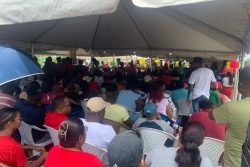On March the 8th I attended a Night of Recognition in honour of Reds Perreira at Bourda. It reminded me of so much.
It is good that the Providence Stadium is now well established in the game. But it remains sad that Bourda is no longer the site for hard-fought cricket between nations. A long tradition, the most remarkable in the whole West Indies, ended. So much was therefore lost. That long brightness fell into shadow. One of the most famous and revered grounds in all cricket history came to an end of its great days at the sunlit summit of the game.
This renowned ground and Club must not be allowed to become simply a scantily written-up footnote in Guyanese, West Indian and world cricket. Its proud history must be suitably inscribed in our annals.
This year,2023, marks the Georgetown Cricket Club’s 165th anniversary. Suitable ways and means to restore the glory of its extraordinary achievement in cricketing and sporting history should be found.
The Georgetown Cricket Club is not only the oldest cricket club in Guyana, it is the oldest cricket club in the West Indies. It has an unsurpassed record of firsts.
It organized the first ever inter-colonial match in West Indian cricket when it sent a team from Demerara to play Barbados in 1865 – that was the first overseas tour made in the West Indies and I’m afraid we lost to Barbados. Then in September 1882, a GCC member, E F Wright, hit the first 1st class century ever made in the West Indies, 123 (out of 168) against Trinidad in Georgetown. The GCC also sponsored the first overseas tour ever made by a West Indian side when it organized 14 players from Guyana, Trinidad and Jamaica to visit the USA and Canada in 1886. Then in 1887/88 the Americans paid a return visit to the Caribbean to become the first side to tour the West Indies – and Guyana beat them by an innings at Bourda: the first victory over a touring side in West Indies cricket!
And, perhaps most famous of all, the first time the West Indies ever beat England was at the GCC during the 1929-30 MCC tour when George Headley hit his immortal centuries in each innings.
The Club was founded in 1858. Think what an age has passed since the Club began! In 1858 the Crimean War – England and France versus Russia – was just over. In India the great mutiny against the British, which had begun in 1857, was still raging. In the United States the southern slave owners were threatening to secede and Civil War was looming in that country. Two of the greatest writers who ever lived – Charles Dickens in England and Fyodor Dostoyevsky in Russia, were busy writing their marvelous novels.
In the colony of British Guiana it was only 25 years after emancipation. Sir Philip Wodehouse was Governor. There was a big cholera scare in Georgetown. The “Archangel Gabriel” riots were still fresh in memory. There was a serious water shortage, with the Lamaha Canal rapidly becoming inadequate for the growing wants of the City. Indeed I regret to report that in that year 1858 a Mr. McDonald of Ogle was reprimanded for secretly diverting water at night from the Lamaha for his own purposes. The sugar market was depressed – the price was only 24 shillings per cwt in London. Josiah, George and Richard Booker were buying up sugar plantations, after starting in cotton and shipping. Indian indentured labourers were flooding into the country. Only five years before, in 1853, the very first Chinese had come to the country.
In cricket, it was very early days. WG Grace was only 10 years old and was still five years away from starting the most illustrious career in the history of the game. Only the year before, in 1857, Thomas Hughes had written the first and one of the most famous descriptions of a cricket match in his Tom Brown’s Schooldays. In 1858 the MCC hadn’t yet authorized over arm bowling – that only came in 1863. In 1858 the first touring team from England hadn’t yet left for Australia – that only came in 1862. In 1858 those famous English county clubs – Yorkshire, Lancashire and Middlesex – hadn’t yet been founded: the GCC is older than any of them. Indeed, there can be no doubt that, if it was written, the history of the Georgetown Cricket Club would have a high and honoured place not only in the history of cricket in this country, not only in the history of cricket in the West Indies, but even in the whole history of the game. In Trinidad, for instance, the famous cricket club at the Queens Park Oval only dates back to 1896.
Bourda is certainly one of the most distinguished grounds in the whole history of the game. Ghosts of immortal cricketers haunt the club’s corridors and dressing rooms. It will be very sad if this great institution is not suitably honoured and heralded by its members, by cricketers everywhere and by the nation.







